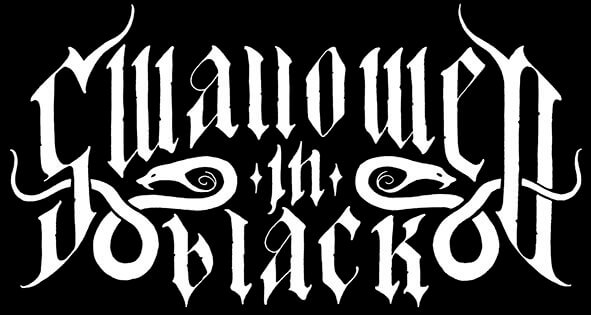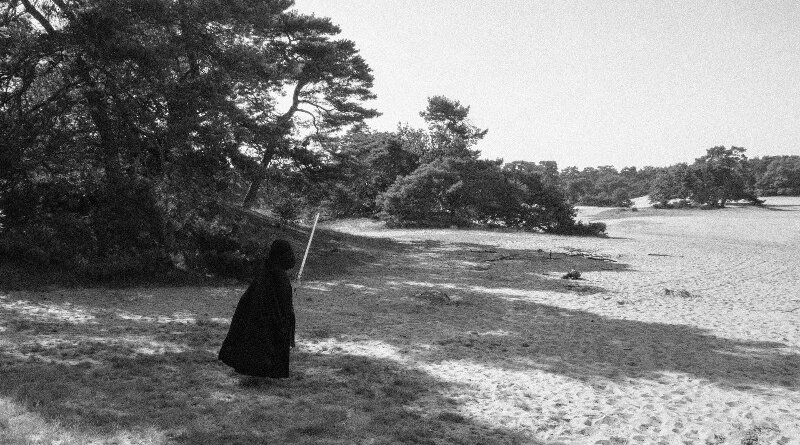“IT EMERGES ORGANICALLY DURING PROLONGED GUITAR STRUMMING SESSIONS, WHERE IT FEELS LIKE I’M TAPPING INTO A PRIMORDIAL FORCE AND LETTING THE MELODIC SPIRITS THAT ARISE TAKE OVER” – EL INVUNCHE
From the past comes the storms of Invunche, whose ceremonial second full-length ‘Atavismo’ challenges conventional methodologies to conjure across time and place a unique offering of Ancestral Black Metal. From a state of uprooted isolation, El Invunche, the chosen vessel for this inimitable art, sheds a glinting shard of elucidating light on shamanic impulses, sun and moon worship, sacrificial rites and the misanthropic spirit that guides his hand.
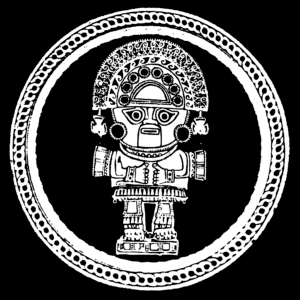 Transcending language and confounding human understanding, music is a gift from the gods. In its most primitive essence, music is ritual, unbounded by time or place. Through Invunche’s primitive sonic shamanism, are you offering a voice or vessel to your ancestors, commemorating / summoning the indigenous tribes of your native Chile, reaching out to them across the millennia? Do you hear their voices and feel their presence every day?
Transcending language and confounding human understanding, music is a gift from the gods. In its most primitive essence, music is ritual, unbounded by time or place. Through Invunche’s primitive sonic shamanism, are you offering a voice or vessel to your ancestors, commemorating / summoning the indigenous tribes of your native Chile, reaching out to them across the millennia? Do you hear their voices and feel their presence every day?
“I wouldn’t say I hear the voices daily, but I definitely feel this sense of lineage and the echo of the past flowing through my music and art. The way I connect with my ancestry feels different than most, because I was uprooted at a young age. Whilst I have visited Chile many times in my life, much of my engagement with my heritage is mediated by books, music and images. Hearing the sounds of Andean folk music or seeing images of Machu Picchu instantly transports me far away from the wetlands of the Netherlands where I currently reside. This is what I aim to evoke with the sounds of Invunche – like a sorcerer casting a spell that transports the listener to a different place and time.”
The eternal call of the past cannot be silenced. Almost like it’s hardcoded into our DNA. Do you identify more closely with the culture, customs and traditions of the old Chile of a bygone era than the colonised nation that exists today? Is a return to reside once more in your native land the natural – and perhaps inevitable – resolution to your sense of detachment or is it too late: are the time, place and people commemorated, celebrated and consecrated through your art gone forever?
“What I admire about these cultures is that they seemed less distracted, more in touch with the planet and their true purpose in life. I think much of this is gone in modern day cultures, be it Chilean or otherwise. I can’t say if I will ever return, but I do feel that at one point I shall move away from the urban sprawl towards less crowded areas and closer to nature.”
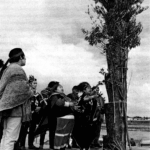 Like most – if not all – ancient civilisations, the Mapuche people were finely attuned to the spirit world, existing in and interacting with the spiritual realm as well as the physical one. They were totally at one with the natural world around them, respecting it reverentially. A stark contrast to modern times! For all the technological advances we’ve made as a species, have we lost even more?
Like most – if not all – ancient civilisations, the Mapuche people were finely attuned to the spirit world, existing in and interacting with the spiritual realm as well as the physical one. They were totally at one with the natural world around them, respecting it reverentially. A stark contrast to modern times! For all the technological advances we’ve made as a species, have we lost even more?
“We have lost much and paid a high price for these technological advances: a burning planet, disconnection from the environment, from others and even from ourselves. The digital spaces we created were meant to bring us closer, but have become yet another battleground for our petty tribal wars. Even worse is that people seem to take everything at face value, not wanting to delve deeper and have in-person conversations to truly learn about each other’s worldview – perhaps out of fear of having to grapple with conflicting ideas, who knows?
“Beyond this, I also feel that we have lost our sense of innovation and adventure, culturally speaking. Technology has given us access to the whole history of cultural works, which is amazing but also debilitating. It’s like we are stuck, endlessly recycling old ideas, rehashing some obscure music genre or movie franchise. I myself worship at the altar of ‘70s drum production, like many, but will we ever be able to imagine something new that is just as enticing?”
Considering how creatively bankrupt and intellectually offensive what is often passed off as art these days is, and the fact that most people listen to music on their ‘smart’phones and are oblivious to the nuance of sound dynamics, I very much doubt it! What is it about the ‘70s drum sound you enjoy – that it is more organic, ‘live’, earthy and less compressed / artificial sounding? Is ‘Four Sticks’ a good example? Is it an analogue versus digital thing? Could you mention some artists or recordings with the drum production you worship? And what measures do you take to recreate this drum sound – and a more retro / analogue vibe overall – in Invunche creations?
“Drums from that era just sound ‘right’ to my ears, it’s this perfect combination of dynamics, warmth and punchiness without sacrificing crispness or clarity. For Invunche, I’ve mostly just recorded digitally with inexpensive microphones but with ‘Atavismo’ I wanted to pursue this vintage drum sound. That’s why I chose E-Sound Studios, which still has much of its original ‘70s-era recording gear from when it operated under a different name.
“Regarding concrete examples, I’d say ‘Four Sticks’ is spot on, also early Judas Priest, ZZ Top, Jerusalem, Ancient Grease, Zior and many more. I also found this drum sound across various genres, here are some songs that have it:
Psych/Folk:
- Neu! – Hallogallo (1971)
- Jimmy Carter and the Dallas County Green – Summer Brings The Sunshine (1977)
- Arco Iris – La Canción de Nahuel (1972)
- Steeleye Span – One Night as I Lay on my Bed (1970)
- Lô Borges – O Trem Azul (1972)
Jazz/Library
- Hans Haider Group – Chaconne In Beat (1973)
- Cloud One – Dust to Dust (1976)
- Brian Bennett – Solstice (1978)
- Arawak – Accadde a Harlem (1970)
Pop
- Jeanette – El Amor Toca El Violín (1977)
- Pages – If I Ever Saw You Again (1978)
- Taeko Onuki – Tokai (1977)
- Anything by Steely Dan
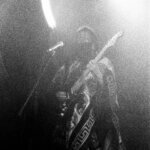 While too much Black Metal is derivative, same-sounding, one-dimensional and uninspired, Invunche is the opposite as you distil such a rich variety of styles and influences into your unique soundscape. Incorporating elements of primitive punk and psychedelic rock, the result is an urgent and almost primal punky variation on the traditional BM blueprint that is not unlike Ildjarn, Bone Awl, Volahn or Akitsa, but I suspect that maybe you are not influenced by any of these and that perhaps your primary musical influences – assuming you consciously have any – are not Black Metal at all?
While too much Black Metal is derivative, same-sounding, one-dimensional and uninspired, Invunche is the opposite as you distil such a rich variety of styles and influences into your unique soundscape. Incorporating elements of primitive punk and psychedelic rock, the result is an urgent and almost primal punky variation on the traditional BM blueprint that is not unlike Ildjarn, Bone Awl, Volahn or Akitsa, but I suspect that maybe you are not influenced by any of these and that perhaps your primary musical influences – assuming you consciously have any – are not Black Metal at all?
“I’ve always been into different styles of music, but have mostly played in punk bands before. Invunche was a continuation of this but with a deeper, more spiritual layer – something I was missing in punk. The bands you mention all have this added spiritual layer so I naturally gravitated towards those sounds as inspiration. Beyond these heavier bands, I found the same spiritual essence in Andean folk (Inti-Illimani, Los Jairas), psych/prog influenced by Andean sounds (Los Jaivas, Los Grillos, Wara), but also the electronic sounds of Jorge Reyes and the album ‘Quetzalcoatl’ by Tito. All these bands feel rooted in something ancient and transcendent, though coming at it from different angles.”
Invunche’s music is labelled as Ancestral Black Metal; Shamanic Black Metal might be just as apt a descriptor. There’s certainly a very strong shamanic and transcendental quality to ‘Atavismo’. Performing ritualistic healing, shamans enter an alternative state of consciousness to provide a direct link between the spirit world and the physical realm, with primal music often prominent in the ritual. Is shamanism an area that fascinates you and is this an effect you consciously pursue through your creations or something that happens naturally / organically?
“Shamanism is very fascinating to me, from its core beliefs to the fact that it emerged in various parts around the world. Invunche started before I delved into it, but looking back I can definitely see how certain parts of the creative process can be regarded as shamanic. It emerges organically during prolonged guitar strumming sessions, where it feels like I’m tapping into a primordial force and letting the melodic spirits that arise take over. Conceptually, it made more sense to me after I heard the Hungarian band Galloping Coroners. They described their music as ‘shaman punk’ and showed me how you can incorporate shamanic philosophies into a heavy music style and retain the ritualistic elements of shamanic music. Over time I learned more about shamanism, particularly about machis (the Mapuche shamans). They are known as spiritual leaders of communities and do much more than induce trance-like states – like healing people, shaping collective narratives and maintaining cosmic balance by communing with ancestors and spirits.”
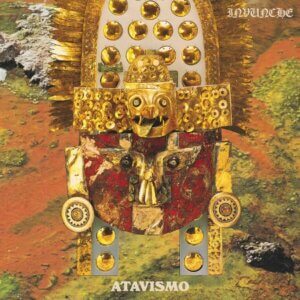 It’s incredible to think that the same sun and moon – two of the central characters on the second Invunche full-length – have gazed down upon every person who ever lived. While our ancestors looked upwards in awe and wonder, the only stars today’s generations worship are those beamed through their iPhones via TikTok, YouTube or the latest lowest-common-denominator anti-human app, but ancient civilisations worshipped the skies and the heavenly bodies naturally suspended therein. ‘Antü’, representing the sun, and ‘Küyen’, representative of the moon – husband and wife, according to Mapuche mythology – are invoked and celebrated via the first and eighth rituals respectively on ‘Atavismo’, while the earth’s oldest and greatest light- and life-bringing celestial bodies are also honoured through ‘El Sol’ and ‘La Luna’. What is the significance of sun and moon within the context of this record and also within your extended worldview?
It’s incredible to think that the same sun and moon – two of the central characters on the second Invunche full-length – have gazed down upon every person who ever lived. While our ancestors looked upwards in awe and wonder, the only stars today’s generations worship are those beamed through their iPhones via TikTok, YouTube or the latest lowest-common-denominator anti-human app, but ancient civilisations worshipped the skies and the heavenly bodies naturally suspended therein. ‘Antü’, representing the sun, and ‘Küyen’, representative of the moon – husband and wife, according to Mapuche mythology – are invoked and celebrated via the first and eighth rituals respectively on ‘Atavismo’, while the earth’s oldest and greatest light- and life-bringing celestial bodies are also honoured through ‘El Sol’ and ‘La Luna’. What is the significance of sun and moon within the context of this record and also within your extended worldview?
“The sun and the moon are key concepts in ‘Atavismo’, both in the literal and mythological sense. In the literal sense, the album is split into Side Sun and Side Moon. Side Sun represents fire, passion, dominion and a more Latin American take on what black metal can sound like. Side Moon represents more traditional notions of black metal and an older style of Invunche. It’s cold, detached, hypnotic and inspired by bands of the Nordic tradition. The mythological aspects come in through the lyrics, as I try to find common threads between these ancient cultures and their gods.
“The sun’s presence (or absence) also has a direct effect on our energy, mood and well-being, of course. Recently, we experienced eleven days without sunlight here in the Netherlands, something that hasn’t happened in many years. The lack of sunlight and its effect took me by surprise, reminding me why these ancient civilisations worship the sun in the first place.”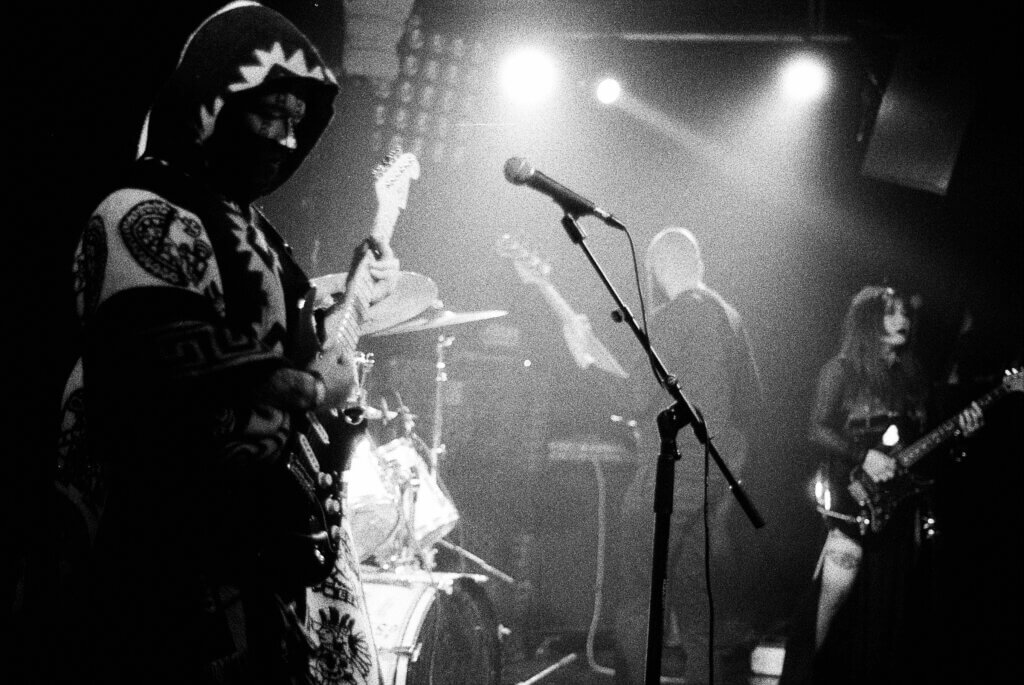 Seems the sun has been cancelled and replaced by low-orbit satellites… Anyway, credited with inventing the bow and arrow, the Tehuelche hero, Elal, is another key character in ‘Atavismo’, immortalised in the mystical almost-twelve-minute epic ‘Elal’, while you have simultaneously released a companion record called ‘Elal y Otros Mitos’ collating harder-to-get older material. What are the characteristics or attributes of Elal that inspire you, and how did the ‘Elal y Otros Mitos’ album come to be?
Seems the sun has been cancelled and replaced by low-orbit satellites… Anyway, credited with inventing the bow and arrow, the Tehuelche hero, Elal, is another key character in ‘Atavismo’, immortalised in the mystical almost-twelve-minute epic ‘Elal’, while you have simultaneously released a companion record called ‘Elal y Otros Mitos’ collating harder-to-get older material. What are the characteristics or attributes of Elal that inspire you, and how did the ‘Elal y Otros Mitos’ album come to be?
“What inspires me about the myth of Elal is the idea of being born into the world with a clear purpose, but having to face specific trials and challenges before fulfilling that destiny. It also represents the growth and transformation of the Tehuelche people – teaching them many things and ultimately guiding them towards better versions of themselves. There is a similar theme in the song itself. Whilst writing it, I noticed it kept growing, new parts emerged and it kept taking these twists and turns before reaching its final form. It’s by far the most ambitious song I’ve written, setting a new standard for what I want to do in the future.
“The ‘Elal’ demo was first released on my label Sinister Sun in 2021. After this release, YK of Nuclear War Now! Productions reached out, saying that he liked the new direction Invunche was taking and suggested we work together on the new full-length that became ‘Atavismo’. We also agreed on a version of the ‘Elal’ demo for NWN, both on cassette and vinyl. At 11:12 minutes ‘Elal’ wouldn’t be enough to fill a whole LP, so instead of doing something like an etching, I decided to include the material from the Ifernach split. That split marked the first time I started experimenting with more traditional black metal and psychedelic rock, so it naturally fits as a bridge in Invunche’s evolving sound.”
 We live in times of horror and there was horror aplenty in the past, too… ‘Qhapaq Hucha’ refers to an ancient lambs-to-the slaughter Inca sacrificial rite where children were ceremonially slain and offered to the gods (presumably to appease them?…). Only the purest offspring were selected and it was considered a great honour for a family to have a child killed in one of these rituals. Never thought I’d say this but it all sounds even more horrific than the fate befalling most of today’s children… Was this some form of social control or manifestation of ancient tyranny, or whatwas the real motivation behind such unthinkable acts?
We live in times of horror and there was horror aplenty in the past, too… ‘Qhapaq Hucha’ refers to an ancient lambs-to-the slaughter Inca sacrificial rite where children were ceremonially slain and offered to the gods (presumably to appease them?…). Only the purest offspring were selected and it was considered a great honour for a family to have a child killed in one of these rituals. Never thought I’d say this but it all sounds even more horrific than the fate befalling most of today’s children… Was this some form of social control or manifestation of ancient tyranny, or whatwas the real motivation behind such unthinkable acts?
“Horrible indeed! Imagine taking the most pure and virtuous children of today’s political elite and sacrificing them so that we can have a strong ROI for the next fiscal year. It’s unfathomable from our modern, secular perspective. But for the Incas, this ritual was deeply embedded in their religious worldview, so I am inclined to think they truly believed it was necessary to maintain cosmic balance with the gods. No one knows what lies beyond death – perhaps the Incan belief was correct and these sacrificed children continue to watch over their ancestral land alongside their ancestors.”
By projecting your attention to the past, are you also averting your gaze from – and turning your back on – an objectionable present? Is there a misanthropic spirit in Invunche? When you look around at the modern world with its social media addictions, corrupt authority, manipulation and exploitation of the masses, ugly architecture, concrete jungles and general apathy / subservience as we are corralled in an orchestrated manner like cattle towards an irreversible anti human dystopian new age governed by AI, is focusing on a better – or even different – time and place the only form of retreat from maddening reality?
“There has always been a misanthropic spirit in Invunche, but with time it has become less of a focal point. When I create music I simply follow my personal interests, which often lead me away from the immediate (and often depressing) reality and towards visions of otherworldly realms. It is what drew me towards heavy metal as a teenager in the first place and why I think it’s an important art form. Heavy metal doesn’t pretend to have any answers or solutions to societal problems; it can be mere entertainment that helps you through the day or something deeply spiritual that informs your philosophy of life.”
